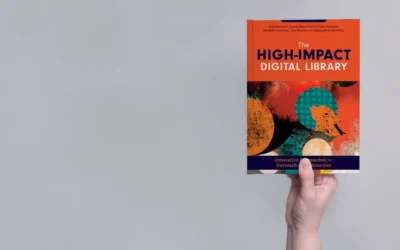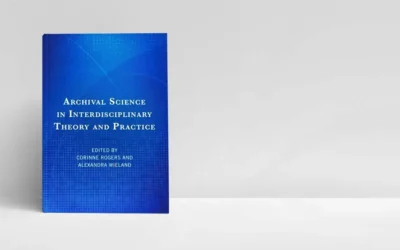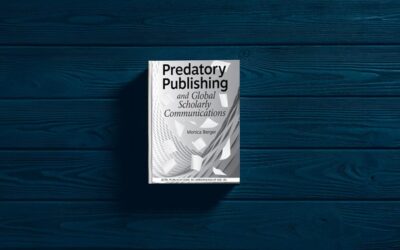Interview with the Author: Allyson Mower on Authorship
Lauren Hays
Allyson Mower wrote Developing Authorship and Copyright Ownership Policies, recently published by Rowman & Littlefield. My interview with her is below.
1. Please introduce yourself to our readers.
My name is Allyson Mower. I am a librarian living in Salt Lake City, Utah working at the University of Utah Marriott Library. I have worked here for 15 years studying the history of reading, authorship, and publishing. I developed the Utah Reading Census last year and have discovered some interesting statistics about the reading habits of Utahns that I hope to publish soon. I run a professional development book club and build collections; the latest includes the France Davis Utah Black Archive. Generally, I am very interested in fostering connections between information access and the creative process.
2. Briefly summarize Developing Authorship and Copyright Ownership Policies.
It is a concise book that provides a historical context for how authorship has developed within the United States and how to use that historical information to build better, more inclusive, and fully equitable teams to produce excellent new works of authorship.
3. Why did you decide to write this book?
I actually really love policies. I serve as the policy liaison for the U of U Academic Senate and get to see how policies can help answer questions and provide guidance about what to do in sticky situations. In addition to that, I happened to be teaching an information policy class as a guest lecturer and as the students and I looked at a copyright ownership policy from a certain institution, the students felt the policy was somewhat unfair because the institution was taking ownership of student works. Therefore, the question of the fairness of copyright ownership policies arose. I had just finished writing another book on copyright policies and workflows focused on libraries. The questions from the students made me realize that this was a bigger question, especially for academia and higher education.
4. Why did you decide to include information on both copyright and authorship?
Copyright and authorship go hand-in-hand. You might be able to have authorship without copyright, but you cannot have copyright ownership without authorship. I wanted to show how the two areas work together. In addition, I wanted to provide good information about how to determine authorship so that those who have legitimately contributed to a work don’t get left out.
5. You describe the book as helping readers “develop inclusive and equitable authorship policies.” Will you explain what those are and why they are important?
Do you remember being assigned to work in a group when you were in school? Everyone contributed something and together completed a project. Sometimes it felt fair and equitable and sometimes it felt like some inequities occurred. It’s like that, but in this instance, this book is geared towards guiding those who will bring the groups together, as well as those who might set the rules about how and when to bring groups together—and those who set the rules about what happens next once the group creates a work. The type of team created, e.g., the background or life experiences or identity of those brought in, needs broad and careful consideration. Not only because of past practices within this country to deliberately exclude people from joining—such as women and minoritized communities—but also because the experience within the team will impact the quality of the work that the team creates. Once the team is established, much like the school classroom group, having clear guidelines about credit for one’s work within the team, general expectations about levels of contribution, and what counts as authorship becomes particularly important for equity, fairness, and accuracy. Accuracy impacts the larger scholarly communication and knowledge generation system—so it is a systematic or holistic question as well.
6. What are two things you hope all readers take away from the book?
First, that people might learn who the first copyright holders were in America and what works they produced! And, second, that they will feel confident in knowing how to establish excellent and fair authorship policies and procedures for their research group, their journal, or their conference, whatever vantage point the reader might come from.
7. Is there anything else you would like to share?
With the help of Salt Lake City-based graphic designer Kassie John, I created some fun authorship swag to go along with the book. Many stickers, a notebook, an apron, some apparel—even a wine tumbler. Check it out at authorship.ink where it will go live soon. This link can also be used https://authorship.creator-spring.com/
Lauren Hays
Dr. Lauren Hays is an Assistant Professor of Instructional Technology at the University of Central Missouri, and a frequent presenter and interviewer on topics related to libraries and librarianship. Please read Lauren’s other posts relevant to special librarians. Take a look at Lucidea’s powerful integrated library systems, SydneyEnterprise, and GeniePlus, used daily by innovative special librarians in libraries of all types, sizes and budgets.
Never miss another post. Subscribe today!
Similar Posts
Researching with GenAI: Tools & Tips for Special Librarians
When GenAI first became widely available, there was a great deal of discussion about how it would “hallucinate”—that is, make up content and sound very sure of itself when doing so.
Interview with the Author: Anna Neatrour on The High Impact Digital Library
Many different types of libraries have digital components, and it is important to get those digital collections in front of stakeholders.
Interview with the Editors: Wieland and Rogers on Interdisciplinary Archival Science
Alexandra Wieland and Corinne Rogers co-edited Archival Science in Interdisciplinary Theory and Practice. My interview with them is below.
Interview with the Author: Monica Berger on Predatory Publishing
Predatory publishing is a concern in all areas of librarianship. In special libraries, librarians work with experts in various fields. It is vital that special librarians understand the sector-relevant publishing landscape, and which publications maintain academic integrity.




Leave a Comment
Comments are reviewed and must adhere to our comments policy.
0 Comments